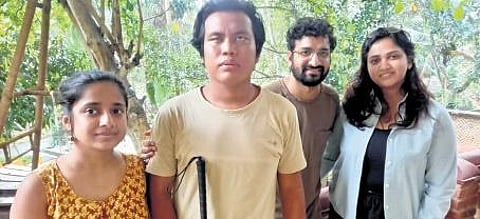

KOCHI: For German native Sabriye Tenberken, life has been challenging ever since she became visually impaired at the age of 12. But that did not deter her from leading an exuberant life, one filled with positivity.
Sabriye also developed a unique ‘vision’ as she grew up. In 1997, while studying Tibetology/Central Asian Sciences at the University of Bonn, she visited the Himalayas and explored the terrain on horseback.
She noted that there was considerable stigma against people with disabilities in the region. Visually impaired children were often neglected, locked away in dark rooms or pushed to begging. A year later, with the help of her Dutch partner, Paul Kronenberg, she started a school for the blind in Tibet.
The school formed the foundation of Braille Without Borders, an organisation that empowers visually challenged individuals to lead a normal life. The couple visited Kerala in 2005 and fell in love with the land. Keen to bring about social change, they set up a leadership institute named Kanthari at Vellayani in Thiruvananthapuram.
And, over the past 18 years, more than 250 participants from across the globe have been empowered as social change-makers with guidance from Kanthari. Interestingly, the centre was initially christened the International Institute for Social Entrepreneurship. However, one day, while having lunch, Sabriye bit into a kanthari chilli. Her tongue was on fire for a while, and she asked her Malayali colleagues about this deceptive little chilli. She noted that, despite its small size, the kanthari was power-packed.
Drawing parallels between the chiili and change-makers who overcame disabilities, Sabriye renamed the institute as Kanthari, and its ‘Dream Speeches’ annual meet as ‘Kanthari Talks’. Ever since its inception in 2009, Kanthari Talks has been making social initiatives, creating a positive impact in the lives of thousands across the globe. Sabriye is backed by her partner, Paul, a techie who wishes to be called a ‘social changineer’.
Participants from across the world have been attending a comprehensive seven-month residential programme at Kanthari, where they get a platform to voice their ideas and also the motivation to overcome adversities. This year, 22 changemakers from 11 countries are camping at Kanthari, brimming with solutions to social problems. Here are some of them TNIE bumped into during a visit:
Bone Sit Paing Hmoo: The 25-year-old hails from Rakhine, located on the Bangladesh-Myanmar border. At the age of 10, Bone met with an accident while playing football, and that left him visually impaired. His mother, Khin Pa Win, a teacher, pushed him to visit Kanthari. Bone’s dream project is Canedom Academy, which focuses on training people with disabilities in administration jobs. Aanand Nagvamshi - He grew up in the upmarket Khan Market area of Delhi – in a tiny 8x10ft room as his mother, Maya Devi, who worked as a maid at a VVIP’s swanky home there. He did multiple job to support his five-member family – manual scavenger, security guard, data entry operator, Uber rider, and hotel staffer. Throughout his life, Aanand always thought of improving the lives of children who grew up in slums. His theatre initiative, Anuvarna (which means a new beginning), is focused on empowering children through art, and it uses props made of waste material.
Sara Surekha Bharat Tandel: Her father, Bharat, died when she was just four months old. The 27-year-old had a traumatic childhood, as one of her uncles sexually exploited her for years. Her mother, Surekha, worked in factories and as a housemaid to eke out a living. Initially, Sara was not aware that she was being sexually abused. She realised it only after some years. Sara’s project, Mukhlafi (which means freedom) focuses on creating a safe environment for children and spreading awareness against childhood sexual abuse. She urges children to speak out.
Anubha Singhal: She was diagnosed with a rare condition – limb girdle muscular dystrophy, which strikes one in 20,000 people – at the age of 17. The neuromuscular disease started weakening her limbs while she was pursuing graduation in architecture. Anubha’s project focuses on utilising design concepts to change the lives of the disabled, and promoting inclusivity through her organisation, EnableMe Access.
Kanthari Talks will be held on December 15 and 16
For details: www.kantharitalks.org